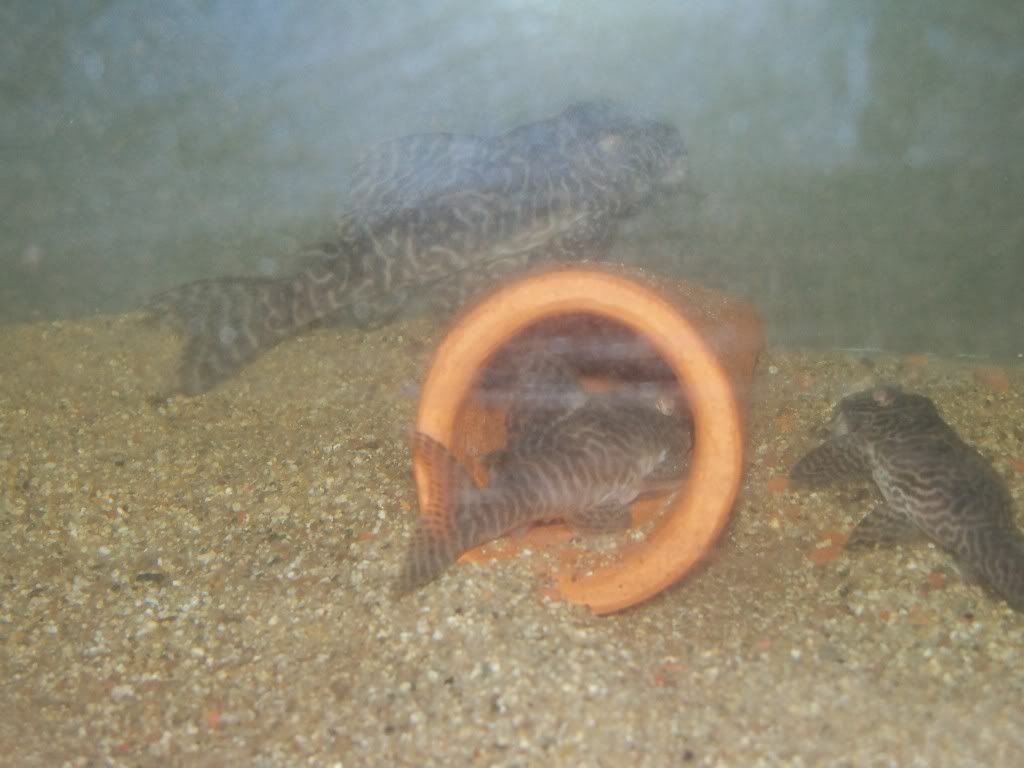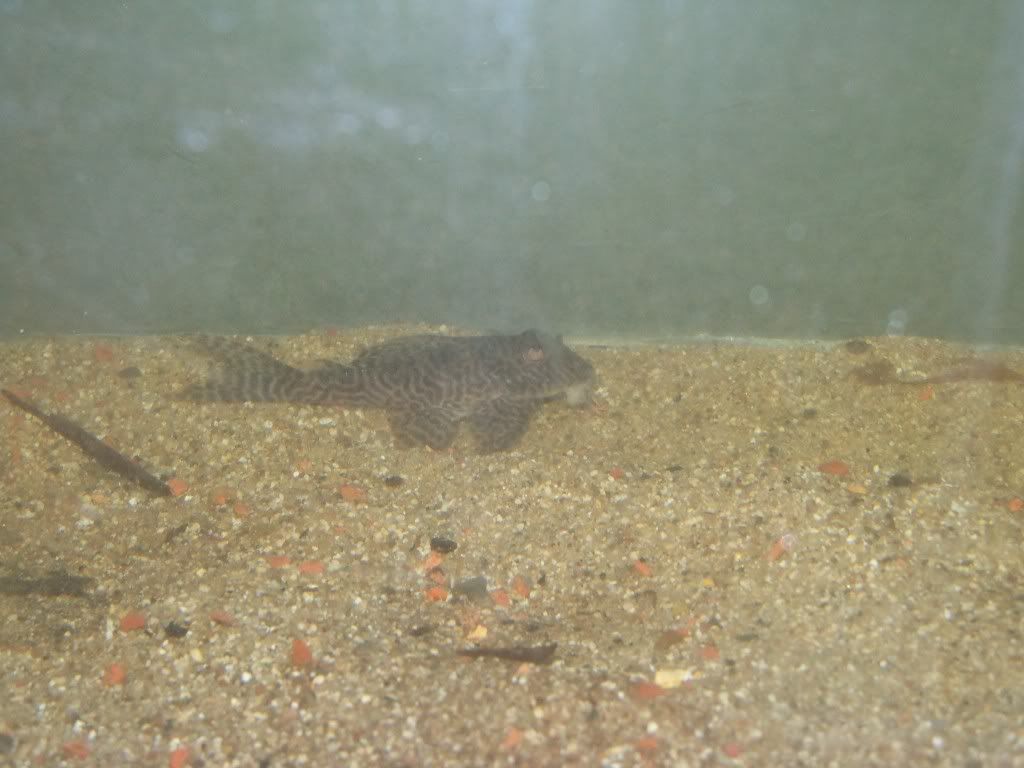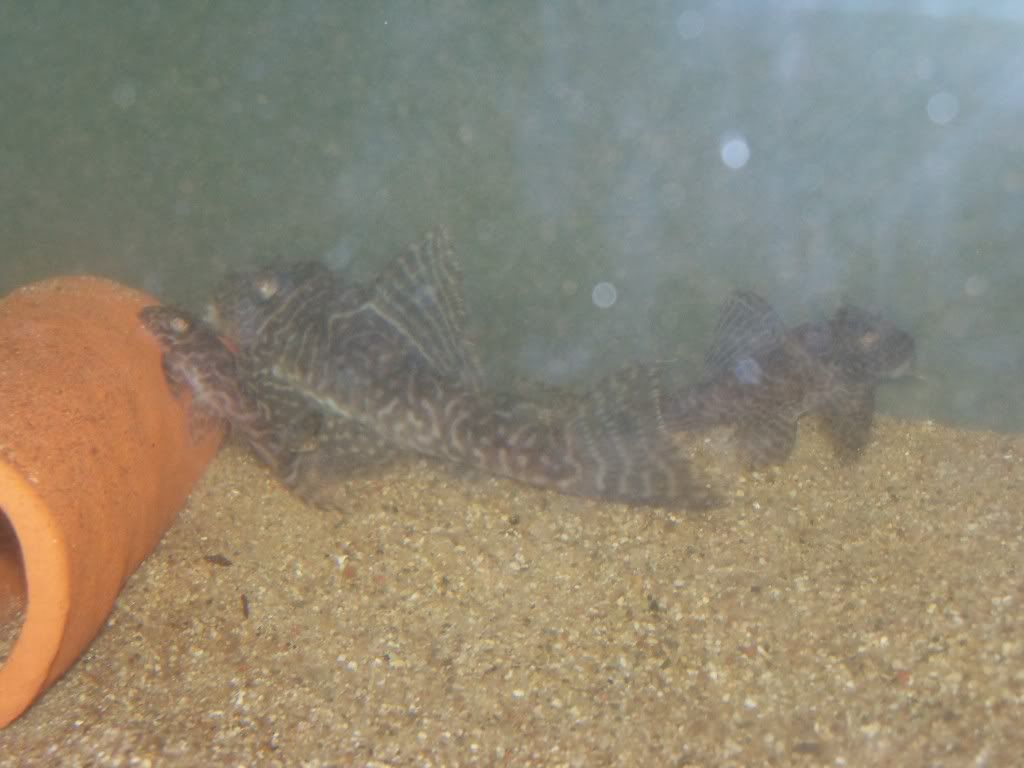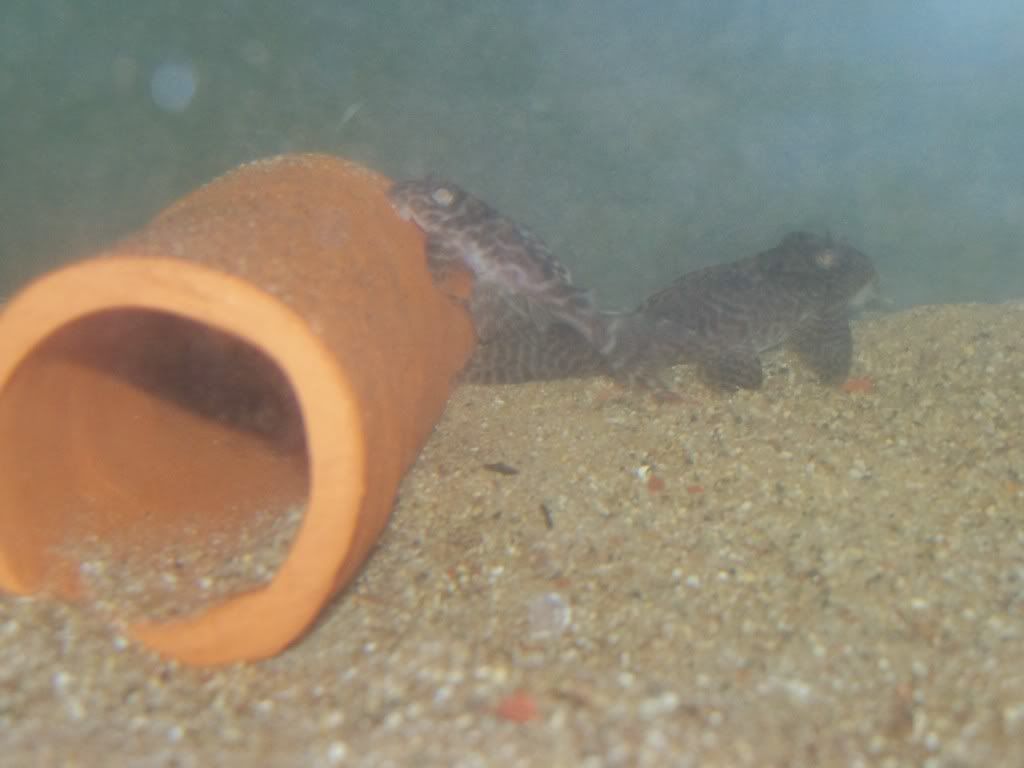Page 1 of 1
Lower Rio Xingus ???
Posted: 22 Jan 2012, 16:50
by plecoboy
Are these all Lower Xingus? The big fish on top of the cave is a male breeder. thanx


Re: Lower Rio Xingus ???
Posted: 23 Jan 2012, 06:12
by Unungy
They look like L66 to me.
Better pictures will help.
Re: Lower Rio Xingus ???
Posted: 23 Jan 2012, 11:08
by Andypex
I'd agree, they look the same as my L066.
Andy
Re: Lower Rio Xingus ???
Posted: 23 Jan 2012, 11:32
by plecoboy
The breeding male killed the female last year. I have four fry left from them. They are gray colored where my L66 fry have yellow color in them.


Re: Lower Rio Xingus ???
Posted: 23 Jan 2012, 14:22
by apistomaster
They look these Hypancistrus I used to have.
Our L-Number experts felt these were L401.
Your photo is not very clear but they sure appear to be the same fish as these.
BTW, Note the scrapes on the side of one of the females in my photo? They could get scrappy amongst themselves. I had a dozen of these.

Re: Lower Rio Xingus ???
Posted: 23 Jan 2012, 15:29
by plecoboy
I have another group that looks more like yours Larry that are my B+W L333s that I got from Shooter50014. Your fish seem to have a hint of brown in them while my fish seem to just be a washed out gray color. The Xingu river plecos are so confusing.

Re: Lower Rio Xingus ???
Posted: 23 Jan 2012, 16:39
by apistomaster
Yeah i get frustrated with the overlapping appearances.
I always saw mine as different from my L333 because those are more brown on a dirty yellow.
The fish in the photo looked like medium gray backgrounds with dark gray squiggles or the reverse.
I have a little color blindness and sometimes I see subtle differences differently from others.
Re: Lower Rio Xingus ???
Posted: 23 Jan 2012, 19:53
by Janne
The first pictured species is L066 and Larry's is still L401

Janne
Re: Lower Rio Xingus ???
Posted: 23 Jan 2012, 21:15
by plecoboy
I'm not disagreeing with you, but why are the fry so different than my other L66 group? I would think the fry would look the same if they are the same species.
Re: Lower Rio Xingus ???
Posted: 24 Jan 2012, 20:29
by apistomaster
Hi plecoboy,
I can't explain why your fish have darker patterns than any L66 I have seen but Janne sees more freshly caught Brazilian Hypancistrus than anyone else and he is involved on location in research on these fish and their biology so I would defer to his judgement.
I have always deeply regretted the accident that killed all 12 of those L401's I had. It was a freak accident and it was one of those species I really hoped to breed.
It would be a stroke of luck if someone had some youngsters for sale at what I would be willing to spend. They are so similar to L333 I wouldn't spend too much on them but they were a nice species. I only paid $25 each for those I lost but they became too expensive to replace after the ban. I bought them listed as L333.
Re: Lower Rio Xingus ???
Posted: 25 Jan 2012, 03:51
by plecoboy
Take a look at this:
http://www.l-welse.com/reviewpost/showp ... 869/cat/30
This is where I got the idea that they were Lower Xingu. They look pretty close IMO.
Re: Lower Rio Xingus ???
Posted: 26 Jan 2012, 23:28
by Janne
Larry,
You can get new L401 this year, they are allowed for export due a technical mistake

Plecoboy,
"Hypancistrus sp. "Garupa" is a ghost.
Janne
Re: Lower Rio Xingus ???
Posted: 27 Jan 2012, 18:05
by apistomaster
It will be interesting to find out how much the newly legalized Hypancistrus species from Brazil will sell for once exports resume in quantities.
That will determine for me whether or not I will invest in any L401's.
I have been trying to improve upon my L260 breeding results. I have about 35 including original wild fish, adult F1's which have spawned and about 15 that are 1-1/2 to 2 inches. Mine do not spawn very often.
Re: Lower Rio Xingus ???
Posted: 27 Jan 2012, 20:40
by pleco22
Hi,
@ Janne,
You can get new L401 this year, they are allowed for export due a technical mistake
Could you please tell us, what this mistake is about. Do you have any Idea, why they will identify the fish. Usually ist very difficult to separate the wormlined Hypancistrus. And the pattern is - as we all know - not the best idea to do this.
Regards
Re: Lower Rio Xingus ???
Posted: 27 Jan 2012, 22:16
by Janne
Could you please tell us, what this mistake is about. Do you have any Idea, why they will identify the fish. Usually ist very difficult to separate the wormlined Hypancistrus. And the pattern is - as we all know - not the best idea to do this.
Just short, all fish that are allowed for export but not yet have been scientifically described had to be sent to the Museum in Sao Paulo as reference material under 2010 (maybe some species arrived in beginning 2011 to the museum). Whom that provide these species was the exporters in Brazil, different exporters was responsible for different species, the one that should send the L333 to the museum sent L401 because in their mind these was also L333 "Alenquer" (it was not we). So, in the new permitted list is L333 Royal King Alenquer but not the real L333 from Rio Xingu... let see how it will work out if even possible to export L333 from Xingu, even if they look similar it can be a problem.
Janne
Re: Lower Rio Xingus ???
Posted: 27 Jan 2012, 22:56
by pleco22
Hi,
thank you. So this means: There will be L 333 before the ban. And L 333 after the ban, wich is L 401 before of the ban. It seems to get really confusing.
Do we will get also L 400, L 287, L 173 (before the ban) as L 66 after the ban?
And what is the size of the fish. Its nearly impossible to identify small Hypancistrus. So perhaps the will catch only adult fishes and that could cause some reproduction difficulties in the habitat. Oh I forget something: The will destroy the whole area soon. So lets get the rest, before the damm is build.
Regards
Re: Lower Rio Xingus ???
Posted: 28 Jan 2012, 00:26
by Janne
thank you. So this means: There will be L 333 before the ban. And L 333 after the ban, wich is L 401 before of the ban. It seems to get really confusing.
Do we will get also L 400, L 287, L 173 (before the ban) as L 66 after the ban?
This is quite irritating that people always think species have been "banned"?
There have never been any ban either before or after, is it so difficult to understand that all these species have been illegally exported?? They have never been allowed for export before but now some species is allowed, that is quite good I think and very positiv by Brazil to allow some species that before was illegally exported and smuggled.
And what is the size of the fish. Its nearly impossible to identify small Hypancistrus. So perhaps the will catch only adult fishes and that could cause some reproduction difficulties in the habitat.
Not sure what you really mean, the fisherman and exporter knows mostly what species they catch and sell, of all sizes. Than it's a responsibility by importers and hobbyist's to not mix them up. Some exporters try to sell one L-number as another maybe more attractive L-number and at a higher price, the importer still have responsibility to buy from a good and reliable exporter and to not offer the same kind of offer fooling customers.
The will destroy the whole area soon. So lets get the rest, before the damm is build.
Not really true even if they will make a huge damage, but people with this kind of thoughts make an equal damage or more to the ecosystem we have on earth. If I would be the boss of IBAMA, I would not allow any collecting of fish from Altamira down to the mouth of Xingu as long they are building the damm, after maybe I would allow when the real damaged are known.
Janne
Re: Lower Rio Xingus ???
Posted: 28 Jan 2012, 15:39
by TwoTankAmin
I would not allow any collecting of fish from Altamira down to the mouth of Xingu as long they are building the damm, after maybe I would allow when the real damaged are known.
The problem is I do not think most people understand the dam building process. The work has to be done under "dry" conditions. To create these "dry" conditions they construct temporary cofferdams to allow the diversion of the river or to create and enclose an area from which they can pump out the water leaving a dry enclosure surrounded by water. This is typically accomplished by dumping the rubble and debris created from building diversion channels etc.into the water to create the cofferdam(s).
During the initial phases of construction on the Xingu dam project there will be massive amounts of debris that go into the river to be washed down stream. Who knows what else might end up flowing down stream. Will there be any oil, diesel, or other vehicle fluids, any construction related stuff that accidentally gets into the water? If you want to bet not, I would be happy to take that bet.
So exactly what do folks think is going to happen to fish and other critters that live in waters described like this: "The Xingu is crystal clear and carries little in the way of sediment." when they become clogged with sediment and who knows what else during the initial phases of dam construction.
My firm belief is that years before the actual dam and diversion channels are completed and functional, a lot of the fish will have long been wiped out. How fatal is it to jump off a 5 story building. I suppose we could wait until the person lands and to assess the damage to determine how wise it was to have jumped.
But the damage does not end here, the above is only the downstream damage during dam building. Again one has to realize what happens when you dam a river. What goes on upstream (behind) the dam. There will be a huge deep "lake" created behind the dam. The depth of the river will be greatly increased behind the dam. The deeper water is, the colder it is. So what can survive in these deeper colder waters that is now living under much warmer/shallower conditions? Not only do dams destroy the downstream ecosystems, but they also trash them upstream as well. And what temperature water might be released to flow through the big bend occasionally?
And even if the construction doesn't wipe out the downstream fish completely, what will happen when the river loses its seasonality and depth from above Altamira to where the Xingu hits the final dam complex where the power is actually generated? And what temperature water might be released to flow through the big bend occasionally?
Given all of the above plus many other things not mentioned, I think it will take an absolute miracle for most of the fish in that region to have even a remote chance of survival. If I was in charge of IBAMA I would want get as many fish out of the river as possible before they are killed off.
Re: Lower Rio Xingus ???
Posted: 28 Jan 2012, 19:28
by Janne
Given all of the above plus many other things not mentioned, I think it will take an absolute miracle for most of the fish in that region to have even a remote chance of survival. If I was in charge of IBAMA I would want get as many fish out of the river as possible before they are killed off.
I really disagree, you mean that we humans have the right and the possibility to keep and save a species in our aquariums and in the same time we increase the damage of nature emptying the river on species? The more species and fish that are left in this part of Xingu the higher is the chance that some of these species
not will get extinct in nature, we don't know which will dissapear or not and if we collect everything we will also extinct species that would survive even the damage of the dam.
Xingu is only cristal clear in the dry season, under rainy season the river is turbid. But you are right that the dam construction already make damages, around Belo Monte and down stream is not possible to collect any fish now... you don't see anything under water more than sediment.
Janne
Re: Lower Rio Xingus ???
Posted: 28 Jan 2012, 19:49
by pleco22
Hi,
This is quite irritating that people always think species have been "banned"?
There have never been any ban either before or after, is it so difficult to understand that all these species have been illegally exported??
Sorry, but the effect was:
- before the ban - every fish was on sale - even Hypancistrus zebra. So I know all the lists, but the effect was …
- after the ban - controll of exporters. The white list was enforced. You could name it like you want. I call it a ban, because that was the effect.
But please don't get me wrong with my sarcastic and ironic statement.
The will destroy the whole area soon. So lets get the rest, before the damm is build.
This is exactly the opposite of what I think. As a breeder of nearly 15 variants of Hypancistrus, I think, that we do not need any wildcaught fish for a long time. Let this little creatures stay were the are.
Regards
Re: Lower Rio Xingus ???
Posted: 28 Jan 2012, 22:14
by racoll
TwoTankAmin wrote:If I was in charge of IBAMA I would want get as many fish out of the river as possible before they are killed off.
I have to agree with Janne. I'm not sure what text books you've been reading, but this is
not conservation as should be conducted in the 21st century.
Brazil are just doing what every other country in the world has done or will do over the coming decades: they are using their natural resources to benefit from the insatiable population growth and consumer demand of humanity. If people really want to help, perhaps they live a more austere lifestyle, perhaps with a few less brand new shiny iThings.
Re: Lower Rio Xingus ???
Posted: 28 Jan 2012, 22:58
by Janne
Sorry, but the effect was:
- before the ban - every fish was on sale - even Hypancistrus zebra. So I know all the lists, but the effect was …
- after the ban - controll of exporters. The white list was enforced. You could name it like you want. I call it a ban, because that was the effect.
Ok, I take it one time more, there have never been a ban and have never existed a ban. These was species illegally exported all the time, they have never been allowed either before or after. If you have a list of species permitted for export and you export other species illegally that is a crime, just what it was and nothing else. Now a few of these before illegally exported species are allowed for export has nothing to do with a "ban", sounds strange to even discuss it... don't people know the difference between illegal and legal?
This is exactly the opposite of what I think. As a breeder of nearly 15 variants of Hypancistrus, I think, that we do not need any wildcaught fish for a long time. Let this little creatures stay were the are.
Easy for you to say, just think on all other people that "want" these species you already have... we are a few billions of people on this earth, you and all other breeders cannot fill the demand and that is the problem for some species.
Conservation of a specie can only happen in their natural habitat, doesn't matter if we have good intentions or not to "save" a species. Everything is not black or white, there are still Hypancistrus, Peckoltia, Panaqua, Pseudacanthicus, Teleocichla, Crenecichla etc. species left after they buildt the Tucurui dam in Tocantins both upstreams the dam and down streams... but I'm sure some species got extinct at that time they buildt Tucurui. All EIA's that have been made both in the past and present before these kind of development is redicolous bad... the truth is that they don't know a shit and are sitting behind their computers copying other works, put it together and make a nice EIA.
Janne
Re: Lower Rio Xingus ???
Posted: 29 Jan 2012, 22:14
by apistomaster
Hi Janne,
I have wondered about the aftermath of the construction of the Tucurui dam on the Rio Tocantins.
It is probably the best example of what the effects of construction and long term operation of the dam has on an Amazon tributary's wild life.
Re: Lower Rio Xingus ???
Posted: 29 Jan 2012, 23:27
by Janne
I have wondered about the aftermath of the construction of the Tucurui dam on the Rio Tocantins. It is probably the best example of what the effects of construction and long term operation of the dam has on an Amazon tributary's wild life.
Yes in one way it's, we still know there are fish living in Tocantins after they built the dam, what we don't know is what was living there before the dam. If we look above water and the terrestrial life, it's just a small percent left in this area compared with before, Where the Tucurui dam are built is very small "islands" of land that have become nature reserves to save for example 1 species of monkey. The native people living there was moved to other locations and one of these was to the reserve in Rio Xingu that now again affect the same people of the Belo Monte dam.
If they put some efforts and made the EIA correctly we would at least know what will be affected, what will get extinct and what they could do to minimize these affects, now it's just a paper without value and just made because they have to make it... how it's made doesn't matter.
Janne








